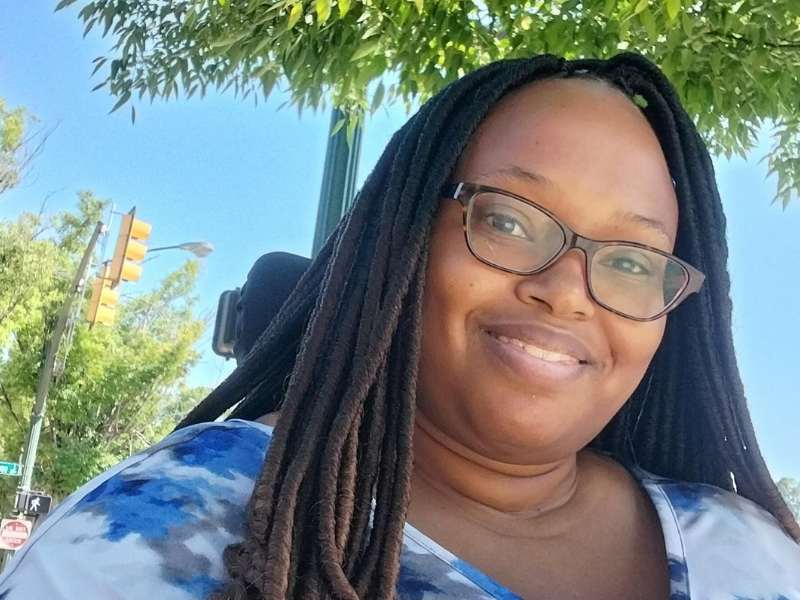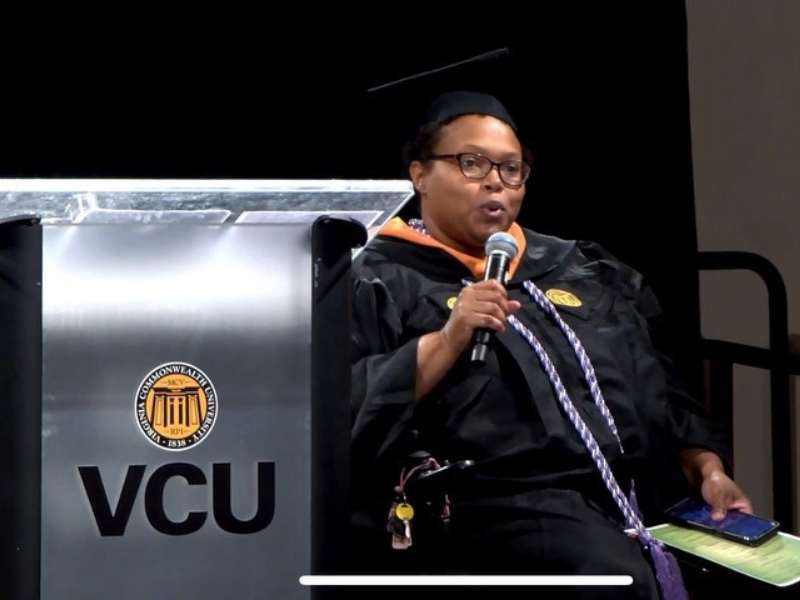Class of 2024: Erin Norwood hopes to make more space for disability in health care
May 10, 2024

With a bachelor’s degree from Virginia Commonwealth University’s School of Nursing, Erin Norwood is ready to help others on a whole new level — and set an example along the way.
Norwood is the first person using a wheelchair to graduate from the school’s accelerated bachelor’s program, and she hopes to raise awareness that people with disabilities can thrive as health care professionals if given the opportunity. Her journey also has been framed by faith and family.
Throughout her life, Norwood has volunteered for churches and Christian nonprofits, leading Bible studies, community outreach events and other activities. When considering careers, she knew she wanted to work in a field where she could provide the same kind of care that she fostered in church groups.
Norwood’s desire to become a nurse also stems from a more personal experience.
“My father died from a heart attack while I was in school. Looking back, he was experiencing many symptoms of heart failure. If we had recognized the signs earlier, it’s possible something could have been done to help him,” she said. “It became even more important to me to have the medical skills to help people wherever I am.”
While Norwood knew she wanted a future in nursing, she faced a unique challenge compared with her classmates. For several years, she has had severe osteoarthritis, which causes extreme pain while walking.
“Typically, the farthest I can walk is from my bedroom to my kitchen, but sometimes the farthest I can walk is just to the front door of my bedroom,” she said.
Norwood first experienced arthritis in one knee while working toward her first bachelor’s degree at Morgan State University, but her pain ultimately worsened over the years to the point where she began to use a walker and take medication. Now she primarily relies on a wheelchair for mobility.
Before applying to nursing schools, Norwood contacted several programs to see whether they could accommodate her disability.
 Erin Norwood spoke at the Accessibility Achievement Ceremony, hosted by VCU’s Office of Multicultural Student Affairs. (Courtesy photo)
Erin Norwood spoke at the Accessibility Achievement Ceremony, hosted by VCU’s Office of Multicultural Student Affairs. (Courtesy photo)“VCU was one of the few schools to say they were willing to work with me,” she said. “Preparing for a career in nursing while bound to a wheelchair has its challenges and obstacles, but I don’t feel horrible about it because it gives me the opportunity to prove that it can be done.”
During her nursing studies, Norwood became especially interested in pediatric intensive care unit nursing. She spent many hours volunteering at VCU Health’s Family Care Center, as well as providing support to pediatric patients and their parents on the ICU floor.
“I really love working with children, especially infants, but I also love the fact that pediatric ICUs are very team-oriented,” she said. “There are doctors, nurses, respiratory therapists and physical therapists all working together. It’s a really great atmosphere for building positive relationships and learning new skills.”
Inspired by a semester working with the Virginia Department of Health, Norwood is also considering a career in community health. With the VDH, she joined various outreach projects, such as administering COVID-19 vaccines and providing food, clothing, diapers and other essentials to local underserved communities.
“There are so many factors that play a part in a person’s health and well-being, such as whether they live in a safe neighborhood, have access to healthy food, have transportation to see a provider, or can afford care or medications prescribed to them,” Norwood said. “During those rotations, we really got to dig into what the health needs were for our local communities and what kind of plans could we come up with to help solve issues.”
There are many people who are able to work as health professionals without being limited by their disabilities. There are plenty of ways that we can make the health care industry more accommodating for disabled workers. It’s just a matter of believing in those ideas and a willingness to implement them.
Erin Norwood
Reflecting on her accomplishments at VCU, Norwood hopes more people with disabilities will pursue careers in health care and that health systems make their spaces more accommodating. She noted that a number of factors must be accounted for when making clinical spaces more inclusive.
“When in nursing school, they teach you to raise a patient’s bed to waist height, but waist height for someone who can stand is not the same for someone who is in a wheelchair,” Norwood noted as an example.
She also hopes students and staff with disabilities feel more open to talk about their experiences in the medical field to show they aren’t alone in their challenges.
As a student, Norwood created a Facebook page to foster an online community for disabled people pursuing careers in health care. Through this group, called “Ability in Disability-Disabled Docs, Nurses, Students, & Others in Medicine,” Norwood shares motivational stories to encourage others.
“There are many people who are able to work as health professionals without being limited by their disabilities,” she said. “There are plenty of ways that we can make the health care industry more accommodating for disabled workers. It’s just a matter of believing in those ideas and a willingness to implement them.”